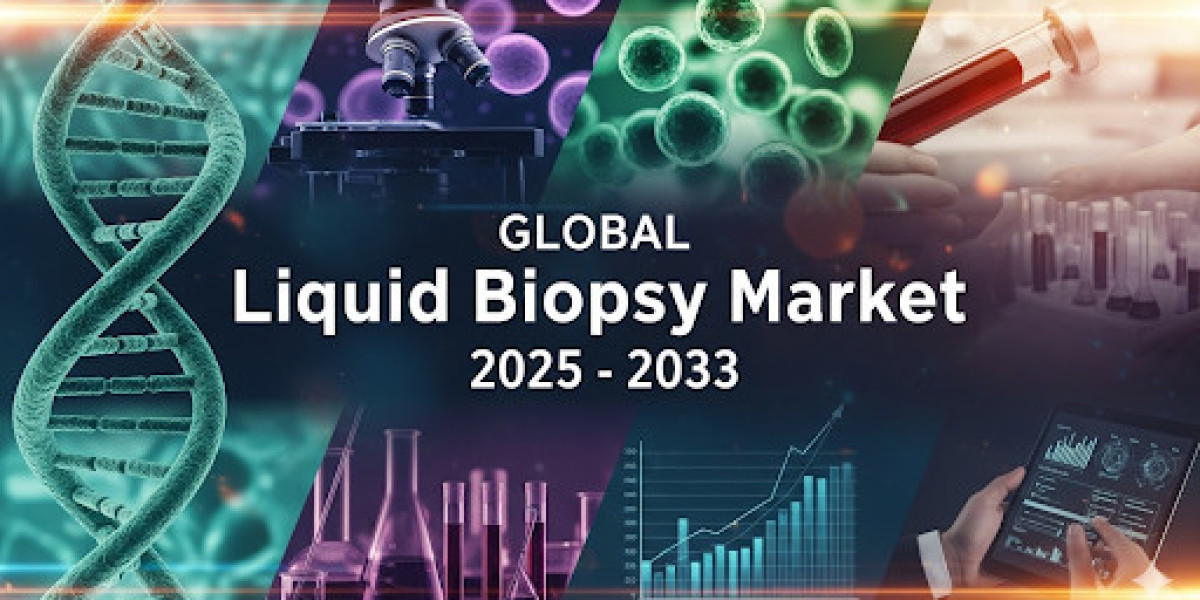The global liquid biopsy market is experiencing significant growth, driven by the rising prevalence of cancer, increasing demand for personalized medicine, and advancements in non-invasive diagnostic technologies. In 2024, the market reached a value of USD 2.3 billion and is projected to expand to USD 7.2 billion by 2033, exhibiting a robust CAGR of 12.82% during 2025-2033. Liquid biopsies offer a less invasive alternative to traditional tissue biopsies, enabling early detection and monitoring of cancer through the analysis of circulating biomarkers in bodily fluids. This approach enhances patient comfort and facilitates timely therapeutic interventions, contributing to improved clinical outcomes.
Study Assumption Years
- Base Year: 2024
- Historical Years: 2019-2024
- Forecast Years: 2025-2033
Liquid Biopsy Market Key Takeaways
- Market Size & Growth: The global liquid biopsy market was valued at USD 2.3 billion in 2024 and is anticipated to reach USD 7.2 billion by 2033, growing at a CAGR of 12.82% during the forecast period.
- Dominant Product Segment: Kits and reagents represent the largest product segment, driven by their critical role in facilitating liquid biopsy procedures.
- Leading Biomarker: Circulating tumor cells (CTCs) hold the largest share among circulating biomarkers, owing to their utility in cancer detection and monitoring.
- Prevalent Cancer Type: Lung cancer accounts for most of the market share, reflecting the high incidence and the effectiveness of liquid biopsy in its management.
- Primary End Users: Hospitals and laboratories are the predominant end users, utilizing liquid biopsy for diagnostic and monitoring purposes.
- Regional Leadership: North America leads the market, attributed to advanced healthcare infrastructure and high adoption of innovative diagnostic technologies.
- Technological Advancements: Continuous innovations in sequencing technologies and bioinformatics are enhancing the accuracy and applicability of liquid biopsies.
Market Growth Factors
1 - Increasing Cancer Incidence
The escalating global incidence of cancer is a primary driver for the rapid growth of the liquid biopsy market. As traditional tissue biopsies are invasive, painful, and often not feasible for all patients, the rise in cancer diagnoses fuels the demand for a more convenient and patient-friendly alternative. Liquid biopsies, which analyze biomarkers like circulating tumor DNA (ctDNA) from a simple blood draw, offer a minimally invasive method for early cancer detection, treatment selection, and real-time disease monitoring. This non-invasive nature, coupled with the ability to track tumor evolution and therapeutic resistance over time, positions liquid biopsy as a critical tool for managing the increasing cancer burden. Consequently, the growing number of cancer patients globally is creating a vast and urgent market for these advanced diagnostic solutions.
2 - Non-Invasive & Early Detection
Liquid biopsies are poised to revolutionize early disease detection by enabling non-invasive identification of disease biomarkers, such as circulating tumor cells (CTCs), circulating tumor DNA (ctDNA), and other analytes like exosomes, in readily accessible bodily fluids such as blood, urine, saliva, and even breath. This offers a less painful and safer alternative to conventional tissue biopsies, allowing for earlier detection, potentially before the onset of symptoms, thereby expanding the window for effective intervention and improving patient outcomes. While the initial focus has been on cancer detection, liquid biopsies are increasingly explored for early identification and monitoring of other conditions like cardiovascular diseases, infectious diseases, and neurodegenerative disorders. However, challenges remain regarding sensitivity and specificity for various disease stages, particularly the early stages, as well as the need for standardization of protocols and further clinical validation to ensure widespread adoption and optimal utility in diverse clinical settings.
3 - Technological Advancements: Next-Generation Sequencing (NGS) & AI, ctDNA & CTC Detection
Next-generation sequencing (NGS) has emerged as a cornerstone technology, enabling high-throughput and accurate analysis of circulating tumor DNA (ctDNA) and circulating tumor cells (CTCs) for cancer detection and management. Targeted NGS panels allow for sensitive detection of known mutations and actionable drivers, while whole exome and whole genome sequencing provide a comprehensive view of the tumor's genetic landscape, identifying various alterations, including single-nucleotide variants, insertions/deletions, copy number alterations, and rearrangements. Illumina sequencing platforms, known for their high throughput and accuracy, are widely utilized in this context. Additionally, advancements in digital PCR platforms enhance sensitivity and enable absolute quantification of rare mutations, particularly valuable for minimal residual disease detection.
Request for a sample copy of this report:
https://www.imarcgroup.com/liquid-biopsy-market/requestsample
Market Segmentation
Breakup by Product and Service
- Kits and Reagents: Essential for the preparation and analysis of samples in liquid biopsy procedures, facilitating the detection of specific biomarkers.
- Platforms and Instruments: Comprise the technological infrastructure required for conducting liquid biopsy tests, including sequencing and imaging systems.
- Services: Encompass diagnostic and analytical services provided by specialized laboratories utilizing liquid biopsy techniques.
Breakup by Circulating Biomarker
- Circulating Tumor Cells (CTCs): Cancer cells that have shed into the bloodstream from a primary tumor, serving as indicators for metastasis and disease progression.
- Extracellular Vesicles: Membrane-bound particles released by cells, containing proteins and nucleic acids, useful for intercellular communication and as disease biomarkers.
- Circulating Tumor DNA (ctDNA): Fragments of DNA released into the bloodstream by tumor cells, providing genetic information about the cancer.
- Others: Includes additional biomarkers such as microRNAs and exosomes, contributing to the comprehensive analysis of cancer.
Breakup by Cancer Type
- Lung Cancer: Accounts for the majority of the market share, with liquid biopsy aiding in early detection and monitoring of treatment efficacy.
- Breast Cancer: Utilizes liquid biopsy for detecting specific mutations and assessing response to targeted therapies.
- Colorectal Cancer: Employs liquid biopsy for screening and monitoring minimal residual disease post-treatment.
- Prostate Cancer: Benefits from non-invasive testing to detect genetic alterations and guide therapeutic decisions.
- Liver Cancer: Liquid biopsy assists in early diagnosis and tracking disease progression in hepatocellular carcinoma.
- Others: Encompasses various other cancer types where liquid biopsy is being explored for diagnostic and monitoring purposes.
Breakup by End User
- Hospitals and Laboratories: Primary users of liquid biopsy tests for diagnostic and monitoring purposes in clinical settings.
- Academic and Research Centers: Engage in the development and validation of liquid biopsy technologies and applications.
- Others: Includes specialized clinics and diagnostic centers utilizing liquid biopsy for patient management.
Breakup by Region
- North America (United States, Canada)
- Asia Pacific (China, Japan, India, South Korea, Australia, Indonesia, Others)
- Europe (Germany, France, United Kingdom, Italy, Spain, Russia, Others)
- Latin America (Brazil, Mexico, Others)
- Middle East and Africa
Regional Insights
North America is the leader in the liquid biopsy market due to its sophisticated healthcare infrastructure, rapid adoption of novel diagnostic technologies, and heavy research and development investments. The region's emphasis on early cancer detection and personalized medicine also drives demand for liquid biopsy solutions. Additionally, favorable regulatory environments and reimbursement policies ease the adoption of these technologies in clinical settings.
Recent Developments & News
Recent developments in the liquid biopsy industry underscore its growing contribution to cancer diagnosis and management. In May 2024, VESICA HEALTH, INC. introduced the AssureMDx test, which improves early bladder cancer detection. In April 2024, SOPHiA GENETICS entered into an agreement with Nigeria-based Syndicate Bio to implement MSK-ACCESS powered by SOPHiA DDM with the aim of enhancing genomic profiling capabilities. In addition, City of Hope partnered with DELFI Diagnostics to introduce the FirstLook Lung test, a blood test that is intended to enhance lung cancer detection rates among underserved populations. These advancements highlight the increasing focus on non-invasive, precise, and affordable cancer diagnostics.
Key Players
- ANGLE plc
- Biocept Inc.
- Bio-Rad Laboratories Inc
- Epigenomics AG
- Exact Sciences Corporation
- F. Hoffmann-La Roche AG
- Guardant Health Inc.
- Illumina Inc.
- MDxHealth SA
- Menarini Silicon Biosystems
- QIAGEN N.V.
- Thermo Fisher Scientific Inc.
Ask Analyst for Customization:
https://www.imarcgroup.com/request?type=report&id=5125&flag=C
About Us:
IMARC Group is a global management consulting firm that helps the world’s most ambitious changemakers to create a lasting impact. The company provides a comprehensive suite of market entry and expansion services. IMARC offerings include a thorough market assessment, feasibility studies, company incorporation assistance, factory setup support, regulatory approvals and licensing navigation, branding, marketing and sales strategies, competitive landscape, and benchmarking analyses, pricing and cost research, and procurement research.
Contact Us:
IMARC Group
134 N 4th St. Brooklyn, NY 11249, USA
Email: sales@imarcgroup.com
Tel No:(D) +91 120 433 0800
United States: (+1-201971-6302)













